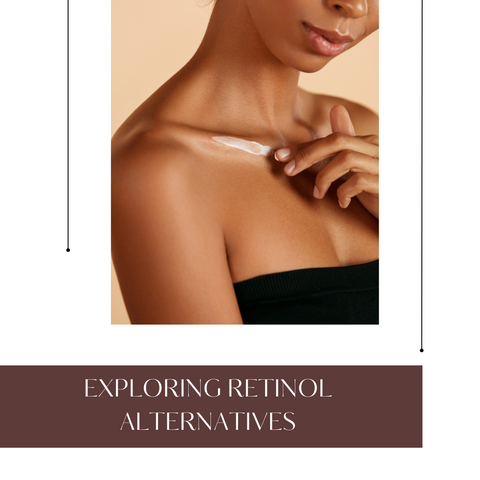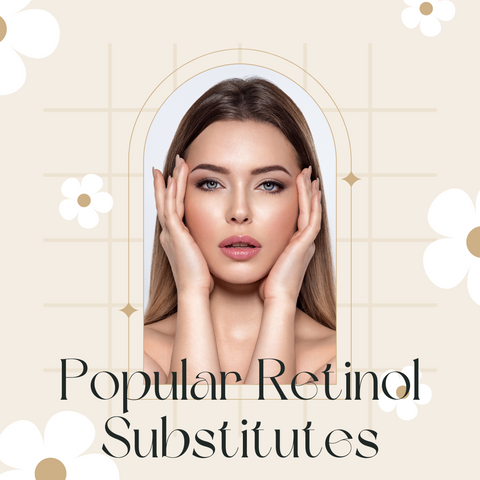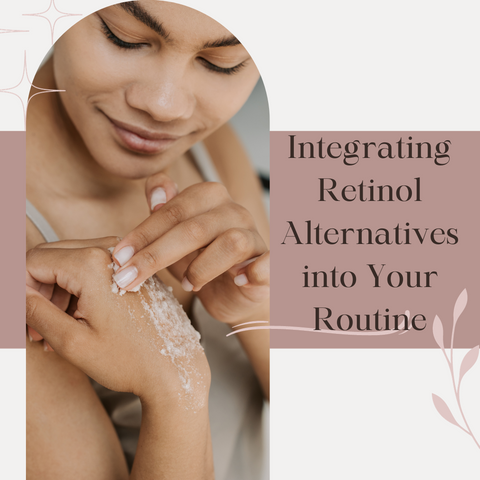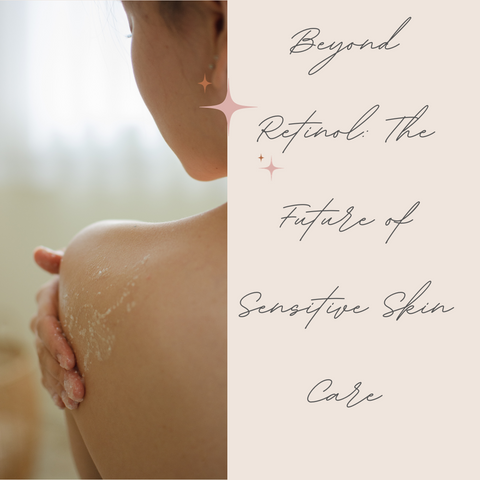- Reasons for Choosing Retinol Alternatives
- Retinol Free Skincare Ingredients
- Alternatives to Retinol
- Tips on Choosing Retinol Alternatives
- Bakuchiol for Wrinkles
- Peptides for Anti Ageing Benefits
- Niacinamide for Skin
- Retinol Free Skincare Routine
- Future of Sensitive Skin Care
- FAQs
Usually, people having sensitive skin often get irritated by using Retinol products. As a result, alternatives that are gentle yet effective are sought after. The main prerequisite for such products is relief from discomfort yet potent action that provides effective results. We, at Clinikally shall help you find such products that are gentle on the skin, yet help you achieve desired results and outcomes. Continue reading to know more!
Exploring Retinol Alternatives

Investigating retinol alternatives can provide helpful skincare solutions, particularly for those with sensitive skin or those looking for alternative components. Bakuchiol, Peptides, Retinyl Palmitate, Granactive Retinoid, Niacinamide (Vitamin B3), Vitamin C (Ascorbic Acid), and Green Tea Extract are some significant alternatives to retinol. These retinol alternatives provide a variety of skincare advantages without the possible irritation associated with retinoids, making them ideal for a wide range of skin types and sensitivities.
Why Choose a Retinol Alternative?
While personal preference is the leading reason, other causes that might make people choose a retinol alternative can be:
-
Different skin types
-
Avoiding allergic/ sensitivity reactions
-
Preference for less potent skincare ingredients
-
Individual skin considerations
-
Health conditions such as pregnancy/ lactation/ planning pregnancy
-
Inherent preference for natural skincare
These are a few reasons that make people look for different options as such alternatives provide a variety of skincare benefits and cater to a wide range of skin types and demands. This makes those alternatives an appropriate choice for many people looking for more effective and gentler skincare options.
Key Ingredients in Retinol-Free Skincare
Retinol-free skincare products often contain various key ingredients that offer skin benefits without the use of retinoids. These ingredients cater to different skin concerns and types, providing diverse options for effective skincare routines. Here are some key ingredients commonly found in retinol-free skincare:
-
Hyaluronic Acid: Hyaluronic acid draws and retains moisture, boosting hydration and plumping the skin while softening fine lines and wrinkles. It aids in the strengthening of the skin barrier, the maintenance of optimal moisture levels, and the overall health of the skin.
-
Vitamin C (Ascorbic Acid): Vitamin C is a powerful antioxidant that protects the skin from free radicals and environmental damage while also brightening the complexion. It promotes collagen formation, resulting in firmer, more youthful-looking skin.
-
Niacinamide (Vitamin B3): Niacinamide strengthens the skin's barrier, lowering irritation and increasing moisture retention. It contributes to a more even skin tone by reducing hyperpigmentation, redness, and the appearance of enlarged pores.
-
Peptides: Peptides promote collagen formation, which improves skin firmness and elasticity while also minimising the appearance of fine lines and wrinkles. Some peptides also help to maintain the skin's natural barrier function, resulting in healthier, more robust skin.
-
Alpha Hydroxy Acids (AHAs): AHAs like glycolic acid and lactic acid exfoliate the skin's surface gently, eliminating dead skin cells, enhancing texture, and increasing cell turnover. They can also aid in the removal of hyperpigmentation and dark patches, resulting in a more youthful complexion.
-
Beta Hydroxy Acid (BHA): BHA, also known as salicylic acid, exfoliates skin, penetrates pores, and aids in pore unclogging, making it ideal for acne-prone or congested skin. BHA has anti-inflammatory effects, which help to reduce the redness and irritation associated with acne.
-
Antioxidants: Green tea extract, resveratrol, and coenzyme Q10 are antioxidants that protect against environmental damage and stimulate skin restoration. They aid in the fight against oxidative stress and the prevention of premature ageing caused by free radicals.
-
Ceramides: Ceramides reinforce the skin's barrier, locking in moisture and protecting against environmental aggressors, ideal for dry or sensitive skin. They help maintain skin hydration and prevent moisture loss.
-
Botanical Extracts: Botanical extracts such as chamomile, aloe vera, and calendula are relaxing and calming, making them ideal for sensitive or irritated skin. Botanical extracts offer a variety of advantages, including antioxidants, anti-inflammatory qualities, and hydration.
-
Allantoin: Effectively promotes cell turnover while soothing skin irritation
-
Squalane: Mimics natural oils of the skin thereby delivering hydration without clogging the pores.
-
Licorice Root Extract: Gently brightens skin and reduces redness or hyperpigmentation.
Natural and Herbal Alternatives for Skin Renewal
Retinol is famous for its tremendous capacity to stimulate the regeneration of skin cells, thereby leading to diminished wrinkles, and improved skin texture. However, this can, in few cases, lead to skin irritation, dryness, or sensitivity. This is particularly common in people having a sensitive or reactive skin. Luckily, nature has a variety of gentle yet effective and potent alternatives to retinol that provide similar benefits without the harsh side effects.
-
Bakuchiol: Extracted from the Babchi plant, bakuchiol effectively mimics the actions of retinol by increasing collagen levels and skin texture without irritating the skin. This results in significant reduction in wrinkles and fading of pigmentation. This all is achieved without the harmful side effects of retinol such as skin purging. In addition it is pregnancy safe and suitable for sensitive skin.
-
Rosehip Seed Oil: Packed with vitamin A, it aids cell turnover, depigmentation, and general skin tone while being highly moisturizing. It is recommended for dry skin.
-
Sea Buckthorn Oil: Natural retinoids and antioxidants that promote skin regeneration and hydration.
-
Carrot Seed Oil: Provides beta-carotene (vitamin A precursor), gently exfoliating and renewing skin without harshness.
-
Cacay Oil: Rich in natural retinol (vitamin A) and linoleic acid, this oil firms the skin and enhances elasticity.
-
Amla (Indian Gooseberry): Rich in vitamin C and antioxidants, amla helps to repair skin and boost radiance.
-
Evening Primrose Oil: Has ant-oxidizing gamma-linolenic acid to enhance regeneration and smoothness in the skin.
-
Licorice Root Extract: Gently brightens and renews the skin while soothing inflammation and sensitivity.
-
Tomato Extract: Has anti-oxidizing lycopene and beta-carotene content, which serves to rejuvenate and guard against dull skin and discolouration.
-
Green Tea Extract: Provides polyphenols to fix the damaged skin, enhance its texture, and calm the skin barrier.
-
Centella Asiatica (Gotu Kola): Increases collagen production, accelerates healing of wounds, and enhances skin strength.
-
Alfalfa Extract: A plant-derived retinol alternative that renews the skin and encourages natural exfoliation.
-
Moth Bean Extract: Packed with vitamin A-like molecules that provoke cell regeneration with low irritation risk.
-
Marula Oil: Is full of antioxidants and fatty acids that restore the liver and skin toning and texture naturally.
-
Chamomile Extract: Although not retinoid-like per se, it has anti-inflammatory properties that benefit gentle renewal in fragile skin.
Selecting natural and herbal alternatives to retinol is particularly helpful for individuals looking for a more holistic or sensitive-skin-friendly skincare solution. These actives provide gentle, plant-powered rejuvenation while maintaining overall skin health and barrier function, making them perfect for long-term use without sacrifice.
Popular Retinol Substitutes: How to Choose the One That Fits You

Choosing the right retinol substitute or an alternative is determined by each individual's skin type and what works well for them and will not irritate their skin. Here's how to choose the right alternative:
-
Skin type: Dry or sensitive skin may require soothing options like bakuchiol, rosehip oil, or peptides; whereas oily or acne-prone skin may have a preference for niacinamide or AHAs. Trilogy Certified Organic Rosehip Oil, Clinikally The Ultimate NIA (10% Niacinamide) Serum and FCL Copper Peptide Serum are highly recommended.
-
Understand your skin objectives: For anti-ageing, use peptides, bakuchiol, and Centella Asiatica. For brightening, use vitamin C, licorice root, or niacinamide.
-
Test for sensitivity or allergy: Select alternatives that are non-comedogenic and hypoallergenic, particularly if you have reactive or allergic skin.
-
Seek multi-functional actives: Select actives that moisturize, repair, and renew—like squalane, hyaluronic acid, or sea buckthorn oil. Hyafab Hyaluronic Acid and Pilgrim Squalane Toner & Mist are few great recommendations.
-
Assess the ingredient list: Make sure the product contains complementary ingredients (such as ceramides or panthenol) to improve performance and minimize possible irritation.
-
Begin slowly and patch test: Even natural substitutes can be irritating—begin with 2–3 uses a week and observe your skin's reaction.
-
Take lifestyle requirements into account: If you are pregnant, breastfeeding, or regularly exposed to sun, use safe, non-photosensitizing alternatives such as bakuchiol or peptides. Also, consulting a dermatologist before trying/ starting any product is highly advised.
-
Consult a dermatologist if in doubt: When it comes to dealing with acne, rosacea, or visible aging, a professional can assist in selecting the best non-retinol actives for your issue.
-
Carefully read ingredient labels: Steer clear of products with mixing irritating actives or alcohols with alternatives; better results come from gentler formulas.
-
Select clinically-tested products: Seek products supported by research or dermatologist approval to guarantee effectiveness and safety.
By coordinating your skin's requirements with the appropriate retinol substitute, you can maximize all the advantages of skin rejuvenation—firmness, radiance, and velvety texture—without sacrificing comfort or long-term well-being.
The Rise of Bakuchiol in Skincare
Bakuchiol's rise in prominence in the skincare business is largely due to its resemblance to retinol in terms of providing skin-renewing benefits without the associated negative effects. Bakuchiol's gentle nature, compatibility with various skin types, and natural origins have made it an enticing option for those looking for effective yet gentle alternatives to retinoids, contributing to its rapid rise in skincare formulations and products.
Benefits of Peptides as Anti-Aging Ingredients
Peptides are revered in skincare for their important function in anti-aging. When applied topically, these short chains of amino acids provide a variety of benefits that contribute to anti-aging skincare routines:
-
Collagen Production and Skin Firmness: Peptides stimulate collagen formation in the skin, which is necessary for skin suppleness and firmness. Increased collagen levels improve skin structure, resulting in less fine lines and wrinkles.
-
Enhanced Skin Texture and Elasticity: Peptides promote smoother, more refined skin texture by aiding in skin rejuvenation. Peptides increase skin suppleness by promoting collagen synthesis, making the skin seem more supple and youthful.
-
Wrinkle Reduction and Fine Line Smoothing: The usage of peptides on a regular basis may help to minimise the depth and look of wrinkles, especially on the face and around the eyes. Peptides soften and reduce the visibility of fine wrinkles, resulting in a smoother skin surface.
-
Hydration and Barrier Function: Some peptides contain qualities that aid in the reduction of dark spots and hyperpigmentation, resulting in more even skin tone. Peptides enhance a brighter complexion by reducing uneven pigmentation.
-
Reduction of Dark Spots and Hyperpigmentation: Some peptides contain qualities that aid in the reduction of dark spots and hyperpigmentation, resulting in more even skin tone. Peptides enhance a brighter complexion by reducing uneven pigmentation.
-
Anti-inflammatory and Antioxidant Properties: Certain peptides have anti-inflammatory effects, which help to calm and soothe sensitive skin. Antioxidant peptides shield the skin from free radicals, reducing premature ageing caused by environmental damage.
Niacinamide: A Skin-Friendly Powerhouse
Niacinamide, or vitamin B3, is a skin-friendly ingredient that provides many of the same advantages as retinol—but without the irritation. It's gentle, effective, and perfect for nearly every skin type, so it's a top choice among those looking for smoother, brighter, and healthier-looking skin.
-
Strengthens the skin barrier
-
Retains moisture
-
Smooths fine lines
-
Refines skin elasticity
-
Shrinks large pores
-
Controls oil production
-
Lightens dull complexion
-
Erases dark spots
-
Soothes redness and quietens irritated skin
-
Defends against environmental stress
-
Moisturizes without blocking pores
-
Smoothens the texture of skin with repeated use
-
Suitable for all skin types and tones
-
Compatible with other active ingredients
Niacinamide is a strong but gentle option for anyone who wants to enhance skin tone, texture, and strength—without the irritating side effects of retinol.
Integrating Retinol Alternatives into Your Routine

Integrating retinol alternatives into your beauty routine requires a calculated approach to maximise their advantages while minimising any side effects. Here's a step-by-step method to efficiently incorporating retinol alternatives, including patch testing and gradual introduction, cleaning and prepping the skin, retinol alternative application, waiting and layering, sun protection, observation and adjustment, consistency, and patience. Begin cautiously, monitor your skin's reaction, and modify usage as needed to get the desired results while preserving skin health and minimising potential irritation.
Creating a Retinol-Free Skincare Regimen
Creating a skincare programme that does not contain Retinol ointments or retinol creams entails finding products that meet the needs of your skin while avoiding retinoids. A retinol-free beauty routine can be done by following the below mentioned steps.
-
Using a gentle cleanser like Cestia Gentle Skin Cleanser to maintain the skin barrier.
-
Applying a retinol free hydrating toner or essence. Rose water and Hyaluronic acid are highly recommended. Haruharu Wonder Black Rice Hyaluronic Toner For Sensitive Skin is one such product.
-
Use a serum that contains bakuchiol, niacinamide or peptides to target the signs of ageing and improve the skin texture. CosiQ Vitamin B3-20% Niacinamide + Peptides Face Serum contains the goodness of both Niacinamide and peptides in one bottle.
-
Layer it with an antioxidant rich serum like Pilgrim Red Vine Face Serum to further boost the skin health.
-
Use a nourishing moisturiser like Clinikally HydraSoothe Moisturiser and to lock in the hydration. Look for the ingredients like ceramides and squalane for adequate moisturisation.
-
Always apply a broad spectrum sunscreen like Clinikally SunProtect Sunscreen SPF 50/PA+++ for complete prevention of photo-ageing.
-
In the evening, incorporate an oil or overnight mask with cacay oil or rosehip oil to efficiently renew the skin. Justhuman Curcumin Picture Perfect Mask is a great recommendation.
-
Exfoliate once or twice a week to promote skin cell turnover. Use gentle AHA’s to prevent irritation. Re'equil Fruit AHA Face Wash and FCL AHA Lotion 15 are great examples.
-
Include calming ingredients like Centella asiatica extract to soothe sensitive skin. SKIN1004 Madagascar Centella Travel Kit contains Centella cleansers, centella toner, centella ampoule and centella moisturiser for proper hydration and skin soothing.
-
Lastly, stay consistent.
A retinol-free routine can be equally as effective when constructed with careful, skin-friendly substitutes. Consistency, balance, and paying attention to your skin's needs are the secrets.
Gentle Exfoliation and Hydration Techniques
Gentle exfoliation and adequate hydration are essential components of a skincare routine for maintaining healthy, glowing skin. Here are some methods for gentle exfoliation and deep hydration:
Gentle Exfoliation Techniques:
-
Chemical Exfoliation: These acids (such as glycolic acid and lactic acid) dissolve dead skin cells on the skin's surface gently, improving texture and brightness. For gentle exfoliation, use AHAs in low concentrations such as Klm Klin AHA Face Wash Gel. Salicylic acid is a common BHA that penetrates deeper into pores and is therefore appropriate for oily or acne-prone skin. It efficiently exfoliates and unclogs pores. Verso Deep Cleanse With Salicylic Acid can be used.
-
Physical Exfoliation: Exfoliate manually with a soft washcloth in gentle circular strokes. To avoid inflammation, avoid hard scrubbing. These soft, natural sponges exfoliate gently and are suited for delicate skin. To eliminate dead skin cells, use with a gentle cleanser.
Hydration Techniques:
-
Hyaluronic Acid Application: Hyaluronic acid attracts moisture to the skin, resulting in extreme hydration. Apply it on damp skin and follow with a moisturiser to lock in moisture. Use hyaluronic acid serums or moisturisers to enhance hydration and keep skin moisturised throughout the day.
-
Use of a Humidifier: In dry environments, using a humidifier helps maintain adequate moisture levels in the air, preventing skin dehydration.
-
Regular Hydration Habits: Maintain overall skin health and hydration by drinking enough water throughout the day. Consume foods high in water content (fruits and vegetables) and essential fatty acids to support skin hydration from within.
You can effectively promote a clearer, more radiant complexion while keeping your skin balanced and hydrated by incorporating these gentle exfoliation and hydration techniques into your skincare routine.
Tailoring Skincare for Sensitive and Reactive Skin
Reactive and sensitive skin needs additional attention and care since it's more susceptible to irritation, inflammation, and discomfort from ordinary skincare ingredients—particularly retinoids. Formulating a personalized routine using gentle, nurturing substitutes preserves the skin while maintaining noticeable results.
-
Avoids flare-ups, redness, and inflammation due to strong or inappropriate ingredients
-
Helps to reinforce the skin barrier, which tends to be compromised in sensitive skin
-
Decreases the chance of allergic reactions or prolonged sensitization
-
Maintains a serene, balanced tone without irritation
-
Prevents over-exfoliation, which can result in dryness or acne
-
Promotes the application of calming and hydrating ingredients over harsh actives
-
Maintains long-term skin health through repair and protection
-
Reduces reliance on harsh actives such as retinoids, which can exacerbate sensitivity
-
Strengthens resilience through regular, gentle care
-
Makes skin care a sustainable, comfortable aspect of everyday wellness
For reactive and sensitive skin, prioritize gentle, soothing formulas that are focused on barrier repair and hydration. Select fragrance-free products, patch test new products, and use ingredients such as niacinamide, Centella Asiatica, and peptides. Steer clear of harsh exfoliants or retinoids, and create a minimalist, soothing routine that fortifies skin in the long run.
Beyond Retinol: The Future of Sensitive Skin Care

Beyond retinol, the future of sensitive skincare holds promise thanks to advancements in component technology, customised solutions, barrier protection, and an increasing emphasis on delicate yet potent formulas. The growth of the business will almost certainly result in more effective and personalised skincare alternatives that match the demands of sensitive skin, boosting comfort, health, and resilience without sacrificing efficacy.
Advancements in Hypoallergenic Anti-Aging Products
Recent advancements in hypoallergenic anti-aging products have made it easier for individuals with sensitive or allergy-prone skin to enjoy effective skincare without irritation. Traditionally, many anti-aging formulas relied on potent actives like retinoids or strong acids, which often triggered redness, dryness, or allergic reactions. Today, formulations are evolving to include gentler yet clinically effective ingredients such as peptides, bakuchiol, niacinamide, and ceramides. These ingredients help boost collagen, reduce fine lines, and improve elasticity without compromising the skin barrier. Innovations in delivery systems, like encapsulation and slow-release technology, further enhance tolerance by minimizing irritation. Additionally, clean and fragrance-free formulations with minimal allergens are now widely available, making anti-aging care more inclusive than ever. This shift reflects a growing awareness in the skincare industry that performance and skin comfort can go hand in hand—offering visible results even for the most delicate skin types.
The Role of Antioxidants in Sensitive Skin Health
Antioxidants are critical to the well-being and durability of sensitive skin. They counteract free radicals—unstable molecules resulting from environmental stressors such as pollution, UV light, and blue light—that have the potential to cause inflammation, redness, and early aging. For sensitive skin, more reactive to such damage, antioxidants serve as a shield, dampening flare-ups and fortifying the skin barrier with time. Ingredients such as vitamin C, green tea extract, niacinamide, and resveratrol not only calm redness but also encourage brighter, more even-toned skin without harsh action. Most antioxidants also possess anti-inflammatory effects, making them perfect for soothing and healing sensitive skin. Continuous use makes the skin more tolerant and stronger, decreasing sensitivity over time. Essentially, antioxidants provide subtle but strong protection, and they are a must in any skincare regimen formulated for sensitive or easily irritated skin.
Embrace Radiance, Gently: The Future of Skincare is Here
The skincare future is now not about undergoing harsh treatments and using abrasive skincare products, but in fact, it lies in taking care of the skin with careful, effective alternatives. Now, with the emergence of gentle, mild yet effective ingredients such as bakuchiol, peptides, niacinamide, and plant extracts, getting young, radiant and glowing skin is achievable without irritation or danger from retinol. The retinol substitutes and alternatives enhance skin renewal, firmness, and brightness with consideration for even the most sensitive skin types. With the union of science and nature, skincare is becoming inclusive, calming, and sustainable—showing that gentleness and a mild approach can lead to transformative outcomes.
_____________________________________________________________
































